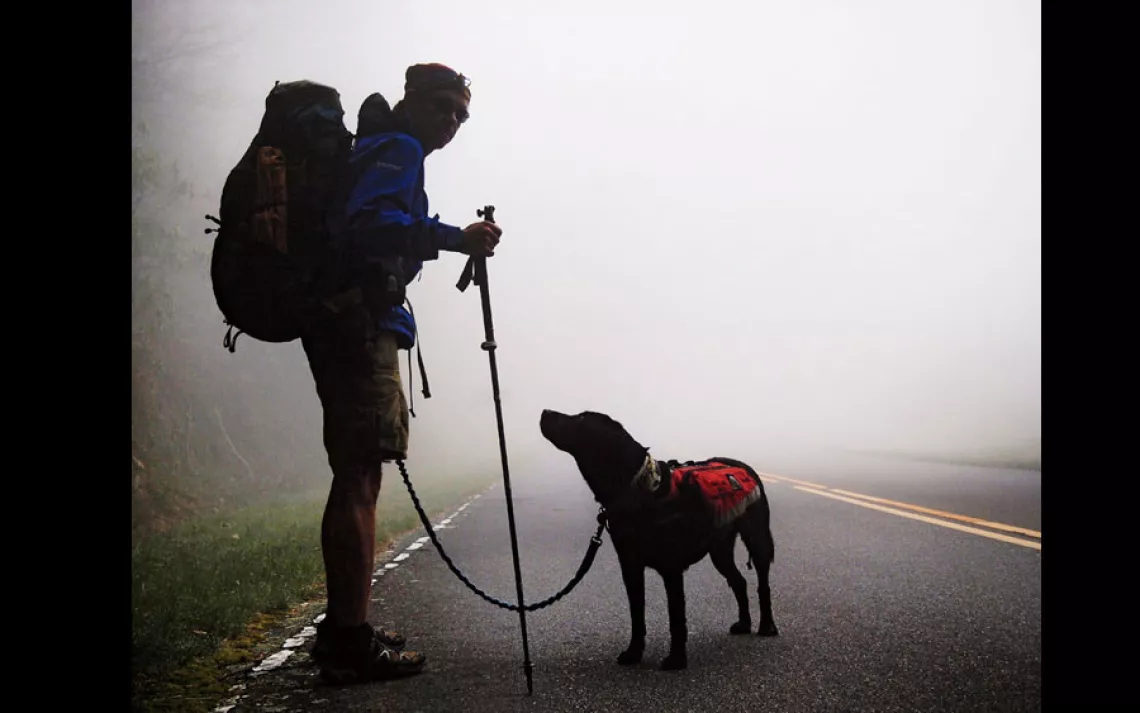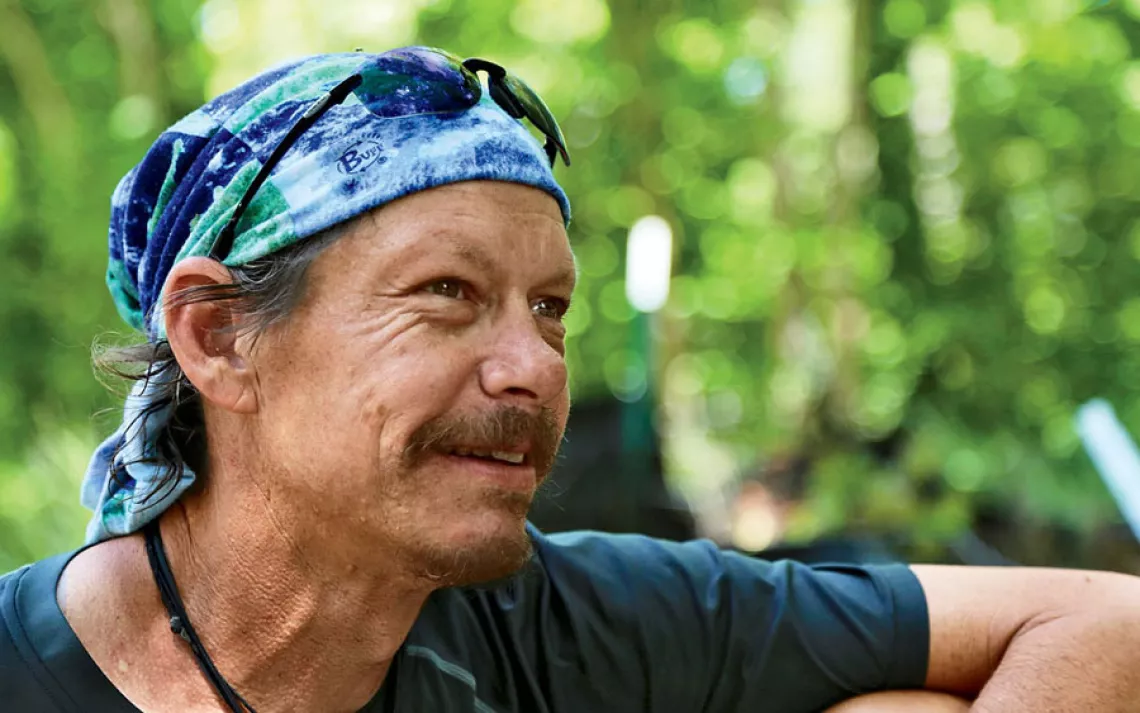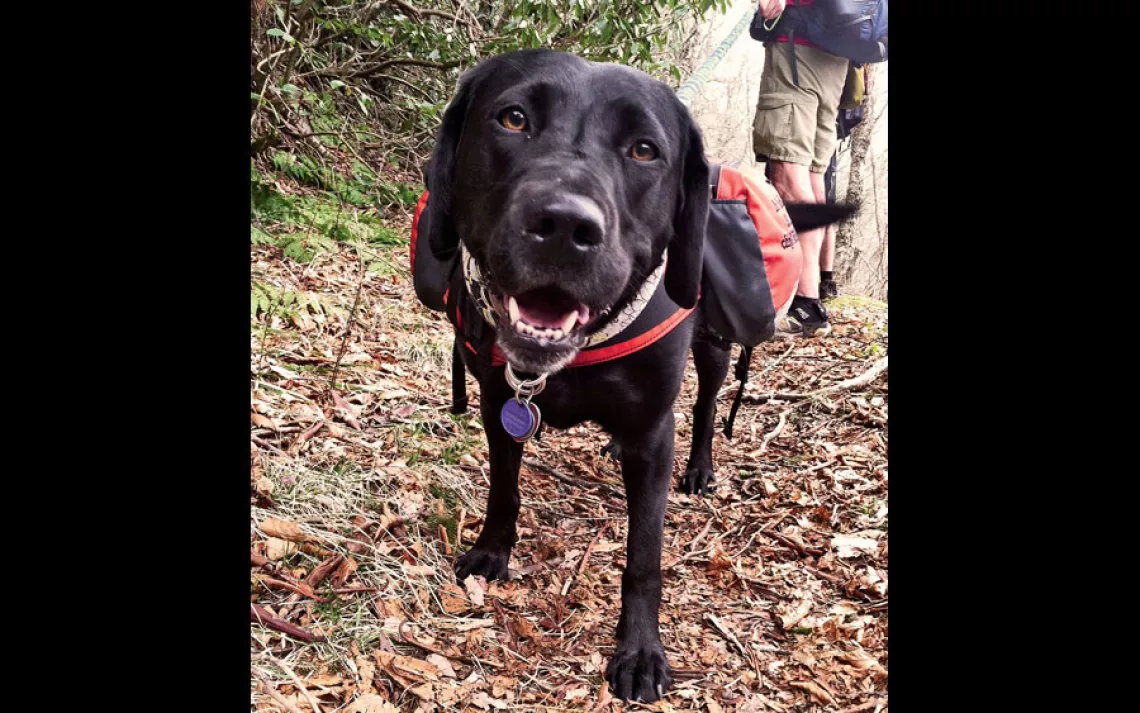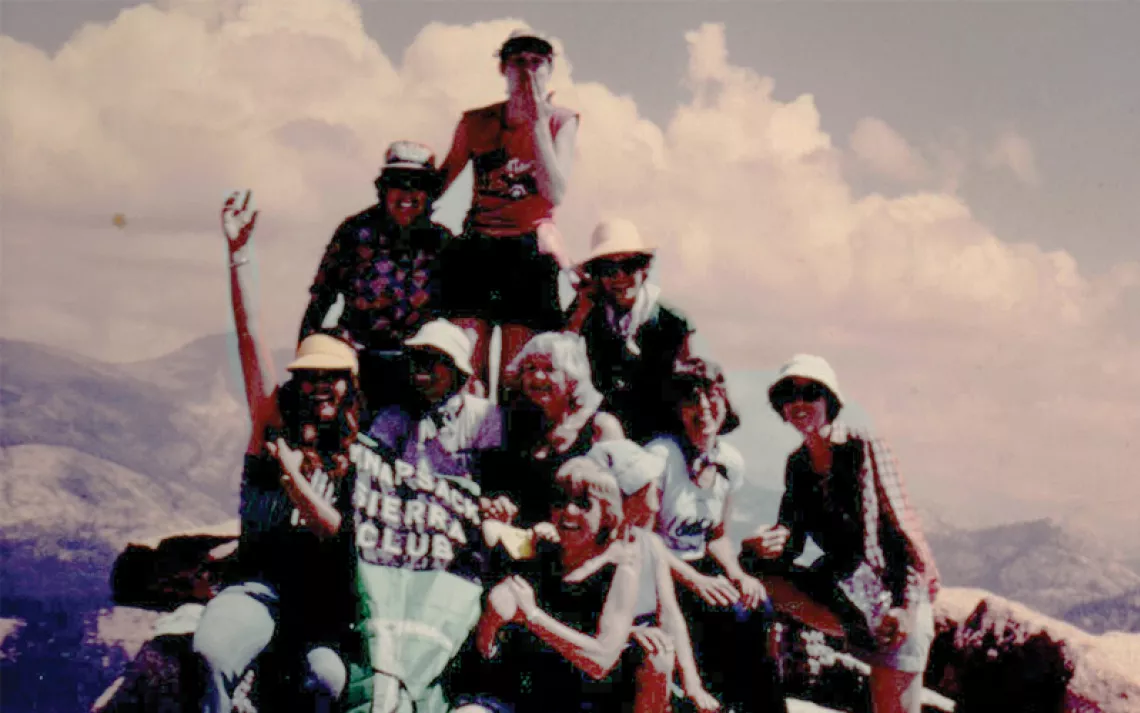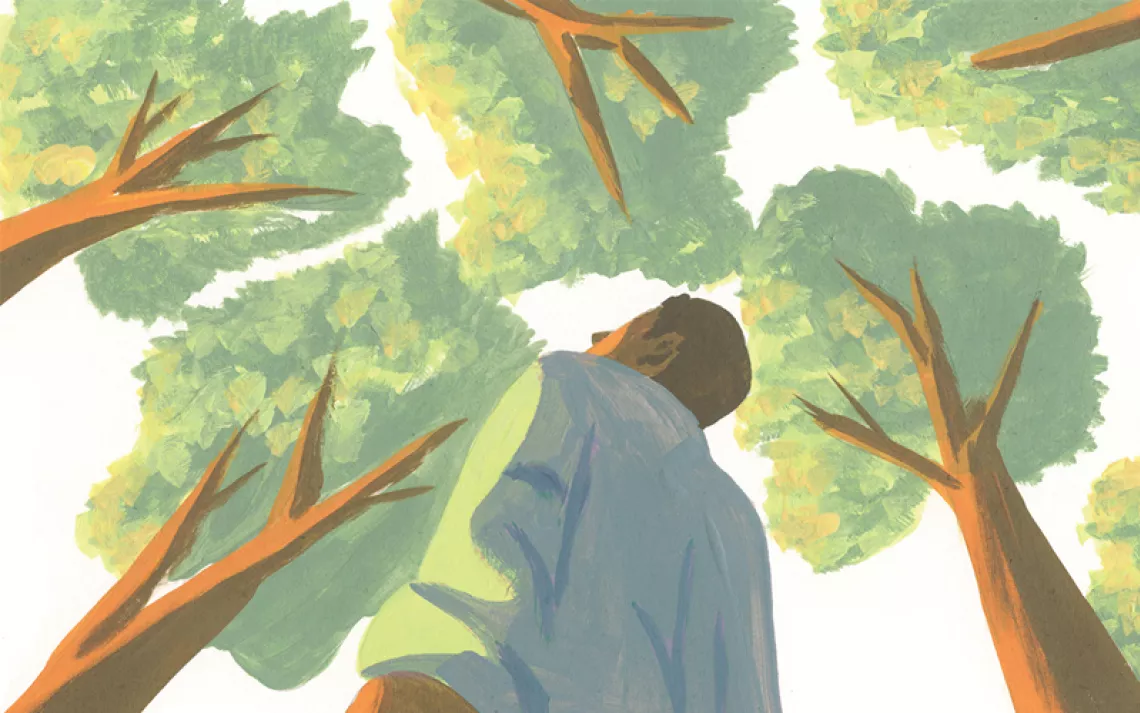Second Sight
Trevor Thomas went blind at age 36. He responded by hiking 18,000 miles.
Click here to hear this article read by the author.
I remember sitting at my kitchen counter, and my mom called and said, "Your brother's going blind." Watching him go through those eight months was the most agonizing time in our family's life. It changed everything.--Liz Thomas
On April 6, 2008, Trevor Thomas paced around a sign at the bottom of Georgia's Springer Mountain, scheming. Because the sign was engraved, he was able to tell that it read, "2.2 Black Gap Shelter." Precisely 2,178.5 miles north was Mt. Katahdin, Maine. This was the southern entrance to the Appalachian Trail. His sister, Liz Thomas, was there to pass him off to his hiking partner, who she believed would be showing up soon.
"Where the heck is this guy?" she asked.
"He'll be here any minute," Trevor lied. His partner had bailed days earlier, but he couldn't tell Liz that. She was his big sister. She'd never let him go alone. He racked his mind for a viable story. Then he had an idea. "Let me talk to the ranger," he said.
After a few minutes, Trevor returned from the register, which was located just up the trail. His lie ballooned. He told Liz that a ranger had found his partner's name and an accompanying note saying that he had begun hiking earlier in the day and that Trevor was to meet him at the Black Gap Shelter. She believed this. Now, Trevor and Liz just had to find a hiker to take him there.
For several hours they lingered in the parking lot, approaching every group starting out on the trail. "Excuse me," he would say, "my name's Trevor Thomas. I'm blind and I need to get to the Black Gap Shelter. Can I follow you there? I just want to walk behind someone." They asked 24 groups for help, and all of them refused. "You want me to be responsible for what?" someone said.
Frustrated, Trevor took a walk up the trail, which wound through a sparse forest. Back in the parking lot, Liz locked eyes with a hiker in his mid-20s named Kevin Rondeau and gave him the spiel: "Excuse me, my brother is blind, and he needs to get to the shanty two miles down the trail. Would you be willing to help him?" She pointed at Trevor, who could be seen pacing amid the trees. There was no hint of his blindness. He walked in swift, straight vectors. His trekking poles, which he used like antennae on the ground before each step, were a seamless part of his hiking uniform.
Rondeau said, "That guy is blind?"
"Yes," she answered.
Rondeau thought for a moment and said, "If that guy is actually blind, he can walk with me as long as he wants."
Thomas and Rondeau hiked together for a week before splitting up. For the rest of the trail, Thomas--now going by Zero/Zero, a trail alias playing on 20/20--floated between hiking partners, but he also hiked solo for long spans. On his first night alone, about two weeks into his journey, it snowed so much that the trail vanished. The next day, convinced that it would be a waste of fuel to melt snow, he spent four and a half hours crawling outward from his campsite in all directions looking for a buried stream to drink from.
Thomas had never backpacked before, yet he was relatively well prepared for the trail. He had spent a year going over the map, memorizing every checkpoint and the distances between with the help of a spirited young employee at a local gear shop. He learned to gauge his walking speed, which helped him calculate how far he'd traveled. He knew where to find water. He knew where to listen for openings in the trees--camping spots--and how to read engraved signs with his hands. When he came to a confusing junction, he assumed that whichever trail felt harder underfoot was the Appalachian, and he was usually right. Still, he would sometimes guess wrong and wander off track for hours. He fell constantly--he stopped counting at 3,000--and broke many bones, including several ribs that he had treated by a veterinarian in a Maine town with no doctor. To finish the trail, he walked 200 miles on a broken foot and with four cracked ribs.
It took him six months to reach Mt. Katahdin. As he came over its false summit, the fierce wind died, and he heard voices on the true summit a half mile away. Zigzagging through pitted snow, he followed the sounds. This was the end of the trail. The sun was out, but the air was freezing. As on any summit, sounds refused to reverberate--they disappeared into a void.
When he reached the top, he picked up a rock. As he handled it, he memorized the moment. The stone was like a photograph for him, the last of dozens he'd picked up on his journey north. This one was a deceptively light chunk of sediment--porous, covered in sharp bumps, and shaped like a railroad spike. He put it in his pocket. His Katahdin stone now sits in a box in his house with many other cherished rocks. He can pick up any one of them and describe the place where he found it.
Thomas borrowed a phone from a fellow summiter and called home. He spoke proudly to Liz and his mother, Judith, and was surprised by the warm congratulations of his father, Mark, a world-renowned flautist with whom he has a distant relationship. "That was the happiest I'd ever been," Thomas recalls. "I felt like I'd gotten my life back."
As Trevor went blind, he was basically going crazy, because he was seeing things that weren't there, and he wasn't seeing things that were there. One day he saw thousands of spiders on the floors and walls of his room. It was horrific.--Judith Thomas
He'd tell me, "Liz, get out of the way! There's people coming in the windows!" His eyes were basically disconnecting from his brain. --Liz Thomas
When I entered Trevor Thomas's room at the Brevard, North Carolina, Holiday Inn last April, he was seated on the edge of a bed, his black Labrador retriever of seven months, Tennille, at his side. Wet camping gear hung in the bathroom, and the room smelled like a dirty sponge. Thomas and Tennille were two weeks into their attempted through-hike of the Mountains-to-Sea Trail, a little-known route that draws a 950-mile arc across the state, from the Smokies to the Outer Banks.
Since finishing the Appalachian Trail five years earlier, Thomas had tried to walk up the country twice more--on the Pacific Crest Trail, which he'd completed, and on the Continental Divide Trail, which, because of snow, he had not. He'd been filmed for several short documentaries and written about in newspapers and magazines. He had a foundation and Facebook fans and speaking engagements. He had people telling him to do a feature-length film and a book.
Now, he slumped forward, exhausted. It was 9:30 p.m. and he still had to organize, repack, check in with his shoe sponsor and his sock sponsor, dictate a Facebook update, and do an interview with a pair of undergraduate documentarians who had just set up a camera in his room. His left leg was numb. There was something wrong with his iPad, paid for by one of his sponsors, so he couldn't post photos to Facebook. Part of him wouldn't have minded leaving it behind, but he felt he owed something to anyone who believed in him. On top of all this, he had to start hiking early the next day--there were 700 miles to go on the Mountains-to-Sea Trail.
The two students adjusted the lighting from drab to bright. Tennille turned onto her back, went limp-wristed, swung her pendulous tail, and pressed her upside-down head into the leg of her owner. She seemed to sense that he just wanted to get this over with.
"Can we turn this off?" The male student pointed at the air-conditioning unit.
"You're going to have to tell me what 'this' is."
"Sorry. The air-conditioning."
"As long as you turn it back on, because I don't know how to do that." Thomas rubbed Tennille's belly with his whole hand. She stretched a leg across his lap.
Thomas had an athletic look--fat-free translucent skin over tubular veins, sinewy legs, prominent clavicles and sternum. His huge sunglasses made him look like a bug. "She's the only dog I know who sleeps on her back," he said, smiling down at her. When they'd first met, she had bonded with him immediately, and now he mocked her choice in a high, whiny tone: "'I don't want to go hiking tomorrow. I don't like getting all dirty. I wish I'd gotten someone infirm.'"
"Can we get you to talk about your logistics?" the male student asked. "Just give us an overview."
"Um, OK. Didn't we already talk about logistics?"
"What about all these bags?"
"You mean the food? Now that's the resupply. I don't know what there is to explain. It's in rows."
In a picture in his head, he could see this resupply. On the opposite bed were Tennille's 21 bags of kibble in one row, with 7 bags of M&Ms and 2 bags of cashews in another row. On the round table were dried mangoes, beef jerky, a mess kit, a camera, the iPad, batteries, smoking tobacco, and more M&Ms. All around the room, stuff sacks lined the wall. Nothing touched anything else.
The male student looked to his partner, a female student on the floor with a microphone, for guidance. She shrugged her shoulders. Tennille began to snore. "I think we have what we need," the male student finally said, and the girl nodded. After turning the air conditioner back on, they left.
"You seem frustrated," I said.
"It's past Tennille's bedtime. And I've got to deal with this stupid iPad thing that weighs five freaking pounds and I can't figure out how to work."
He tried the iPad a few more times but never figured it out, so he gave up and sent it home.
He would become angry, violent. I remember one night I had to come over to my parents' house at one in the morning and sit at the top of the stairs all night because we were worried that he'd think my mom and dad were intruders and attack them.--Liz Thomas
Two days later, Thomas and I were hiking through the Pisgah National Forest when he said, "Let's stop at the spring up ahead."
I perked my ears but couldn't hear anything. We walked for another minute. I saw the water before I heard it. "Oh yeah," I said. "There's a creek." It looked to be rushing down from above.
"I'm pretty sure it's a spring," Thomas said.
We rounded a bend, and I saw that he was right. The spring poured out of the hillside. We sat on logs and took swigs of water. Tennille plopped down in the runoff. Clear, cold water flowed over her haunches.
"Are we in a burn zone?" he asked.
I looked at the canopy of leafless trees. I told him I wasn't sure, but the trees were certainly dead.
"Actually, I don't think it's a burn zone," he said, "because I'd smell that. But there's an absence of sound. This forest gives off an eerie feeling. Now, the forest we were in before we came around that bend was different. I heard birds and leaves and the understory. It was full of life."
"Can you tell me anything else about what you're hearing?"
"The trees are tall and straight and spaced fairly far apart. The hill goes up on that side. It goes down on that side into a valley."
"What about the spring?"
"It opens up into a stream that's about three feet across. It's shallow, maybe about six inches deep. And there are a lot of small rocks in it."
I told him I was amazed by his ability to hear what the world around him looked like, and he said, "I know a guy who can echolocate a quarter on a driveway."
We kept hiking. Thomas walked ahead, trekking pole in one hand, Tennille's leash in the other. When she came to a log of hazardous size, she would stand on it with her two front legs and look over her shoulder for a treat. She also stopped for treats at low-hanging branches, signs, and high steps. She was well equipped for the woods. She had her own sleeping bag, her own backpack, her own sponsors.
As we trekked, Thomas told me of other soundscapes--the desert, and a river that ran over several small ledges, which he heard as a series of whooshings separated by pools of silence. The most overwhelming sonic atmosphere he had ever visited was a rainforest in Washington--a constant patter of water hitting leaves that drowned out everything else. He had never heard anything like a raindrop on a huge fern leaf.
That day we hiked 16 miles and then made camp in a thicket of low-hanging trees. Tennille waited while Thomas put up his tent and methodically unpacked what he would need for the night. Each object had its own spot, the same no matter where he was camped. He unfurled Tennille's abbreviated sleeping bag, which Judith had made by cutting off the bottom third and stitching it closed. He set up his stove.
"I noticed you had the TV on the other night," I said.
"Yeah," he said, seemingly confused. "So?"
"Do you watch TV, if you could call it that?"
"Oh yeah. I watch Discovery, History, Animal Planet, Les Stroud. I even sleep with it on."
"Why?"
"To tell the time. I've got the schedules of about five channels memorized. Plus, it blocks out all the other noises. I wake up easily. Like, a refrigerator turning on--that will wake me up. Footsteps on the street."
I thought back to his house, which I'd visited on my way to meet him because he'd wanted me to pick up some dried meals. He lives in a two-story cookie-cutter town house at the end of a cul-de-sac in Charlotte, North Carolina. To get around town, he walks. Tennille knows how to get to Starbucks, Walmart, and a dozen other locations, some more than five miles away.
The house gives no indication that a blind person lives there. In the bedroom is the largest television I've ever seen. The walls are decorated. He painted them himself, and there isn't a speck of stray paint anywhere. Old backpacks hang on display. Within grasping distance of the living room sofa is a softball-size geode.
"Oh yeah," he said as he got some water boiling. "That thing is awesome."
"What do you do with it?"
"I touch it. It's kind of like entertainment for me."
I thought about the geode's endless nubs and pockets, spires and valleys, smooth domes and sharp ridges. It was a tactile wilderness.
He removed his sunglasses. His eyes were beady and blue.
I asked, "Can you imagine colors?"
"Nope."
"What about faces? Do you remember what people look like?"
"Nope. That's one of the worst things about it. I can't remember a single face." He sucked in his lips and rocked back and forth.
"Not even your own?"
"Not even my own. My mom's face was the last to go. They kind of faded away one by one. Actually, mine was the last face I could remember. The last color I remember is this bright, vivid blue. It was the color of these floating specks that I saw when I was losing my sight."
He poured boiling water into his bag of dried food and let it sit. At his side, Tennille snored. He kept his head pointing in one direction. At 44, he had the wrinkles and gauntness of someone 10 years older. There were thick bags beneath his eyes that never went away.
"Do you miss being able to see?"
"I wouldn't change what happened to me."
The worst night was the last night he had any sight at all. He had this violent headache, and he was screaming and pounding his head on the kitchen counter. Nothing we did made the pain go away. There were points that night when he would stop banging his head and would look up, and there were tears running down his face. I remember one time he looked up like he was trying to see me, and he said, "Why is this happening to me?"--Liz Thomas
Thomas Started going blind in the summer of 2005. He'd just moved back in with his parents after graduating from the University of Nevada, Las Vegas law school. He was preparing to enter the Navy as a judge advocate.
At 36, Thomas was still a kid in his family's eyes, the youngest of four children, a high-achieving, corner-cutting troublemaker with a photographic memory. "He collected bucks from students who didn't go to class and took exams for them," his mother recalled. "He was good with the gals. He had a couple of close friends. Today, you might consider them nerd people. He really always preferred to be by himself. He liked racing cars and jumping out of planes." According to his father, he could read a 400-page book in one hour. But he was also distant, stubbornly independent, even arrogant.
"Trevor had to do things by himself," Liz said. "He was very curt and wanted instant gratification, and everything was all about Trevor. 'Trust no one'--that was his motto."
"I was an asshole," Trevor said.
One day that July, he walked into the house and told Judith, "Don't let me borrow your car anymore. I'm not seeing well."
Several days later, he was out running when something large banged up against him. An elderly woman was on the ground. He'd put her there. He hadn't seen her standing right in his path.
He had no time to cherish the last things he could see. He quickly descended into a blurred world of doctors' offices, of injections and scans, of threatening hallucinations, of migraines, of a visual field that was never constant from one day to the next. He visited several ophthalmologists, each more specialized than the last, but none was able to diagnose his condition (his final diagnosis, fuzzy in itself, is atypical central serous chorioretinopathy). They gave him laser surgery, and they injected cancer drugs into his eyeballs. The treatments only resulted in tremendous pain, mostly from the pressure of the serum inside his eyes, which often took a week to dissipate. Toward the end, his vision would disappear completely, only to return the next day as a single speck of light.
Asked about those eight months, he said, "I blocked nearly everything out. I don't remember most of it, and I don't want to remember."
Blindness was a regression into the past. He was dependent on his parents for everything. He went back to school, where he learned how to walk straight, how to keep food on a plate, how to read the word "cat" in braille, how to be nice to his teacher. He learned to run his hand along the rim of a bowl until he found the spoon, to cover the faucet so he wouldn't spit toothpaste onto it, to listen for traffic, and to memorize grocery aisles. He would have fits. If he worked hard enough, they told him--if he learned to spell and move and control his temper--he might be able to get a job packing boxes. But Thomas did not want a job packing boxes.
"He started going into the backyard," Judith recalled, "figuring out how to set up this tent, figuring out how to cook, working on all the little things that would go inside his backpack. He had to learn how to use the little stove."
"He somehow got it in his head that he would walk the Appalachian Trail," Mark said. "He had a tent in our backyard, and he'd go out at night and sleep there. He's always been very physically fit, but he was never a hiker. He walked a little bit to prepare, but not a lot of hiking. It amazed us."
Trevor announced a few days before starting the Appalachian Trail that he needed a ride to Springer Mountain on a certain day because he had a partner who was going to meet him there. When his partner canceled, Trevor was too fixed on the idea of proving his independence to quit himself.
"When Trevor sets his mind to something," Mark said, "get out of the way. He'll do it."
The day after he lost his sight, there was a weird sense of calm, like it was finally over. But there was also a sense of the unknown. We were setting into uncharted territory.--Liz Thomas
Two weeks after I left Thomas on the Mountains-to-Sea Trail, he encountered the wettest day of his hiking life. He and a partner from his Appalachian Trail hike crossed 16 rivers, all overflowing after a week of nonstop rain that was still coming down. As night fell, they made camp amid rhododendrons that Thomas could smell rotting. They tried to make a fire. While they sat, Thomas felt around in the mud beside the fire ring and found a rock. It was wedge-shaped and sharp.
After three hours of intermittent flames, Thomas brought his rock into the tent, where he lay in a small pool and listened to the rain. It thudded against dead leaves. In puddles, it popped and splashed. On the tent, it made a bursting thrum, something like distant machine guns. Behind all this, the failed fire hissed and the rhododendrons stank.
That's the world Thomas remembers when he holds that rock, because a month later, when he finally got to the end of the trail--after crossing the dry, hot piedmont and the muggy Croatan swamp and the sands of the Outer Banks, where spectators cheered from the beach and his cellphone rang nonstop--there were no rocks to be found. Today, the wedge-shaped rock is still dusted in soot. He can rub his thumb on the remnants of the fire and remember how he got to where he is now.
 The Magazine of The Sierra Club
The Magazine of The Sierra Club
